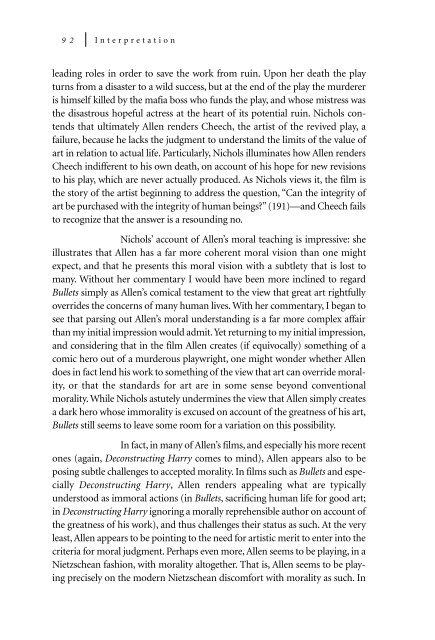Beyond Struggle and Power: Heidegger's Secret ... - Interpretation
Beyond Struggle and Power: Heidegger's Secret ... - Interpretation
Beyond Struggle and Power: Heidegger's Secret ... - Interpretation
You also want an ePaper? Increase the reach of your titles
YUMPU automatically turns print PDFs into web optimized ePapers that Google loves.
9 2 <strong>Interpretation</strong><br />
leading roles in order to save the work from ruin. Upon her death the play<br />
turns from a disaster to a wild success, but at the end of the play the murderer<br />
is himself killed by the mafia boss who funds the play, <strong>and</strong> whose mistress was<br />
the disastrous hopeful actress at the heart of its potential ruin. Nichols contends<br />
that ultimately Allen renders Cheech, the artist of the revived play, a<br />
failure, because he lacks the judgment to underst<strong>and</strong> the limits of the value of<br />
art in relation to actual life. Particularly, Nichols illuminates how Allen renders<br />
Cheech indifferent to his own death, on account of his hope for new revisions<br />
to his play, which are never actually produced. As Nichols views it, the film is<br />
the story of the artist beginning to address the question, “Can the integrity of<br />
art be purchased with the integrity of human beings?” (191)—<strong>and</strong> Cheech fails<br />
to recognize that the answer is a resounding no.<br />
Nichols’ account of Allen’s moral teaching is impressive: she<br />
illustrates that Allen has a far more coherent moral vision than one might<br />
expect, <strong>and</strong> that he presents this moral vision with a subtlety that is lost to<br />
many. Without her commentary I would have been more inclined to regard<br />
Bullets simply as Allen’s comical testament to the view that great art rightfully<br />
overrides the concerns of many human lives. With her commentary, I began to<br />
see that parsing out Allen’s moral underst<strong>and</strong>ing is a far more complex affair<br />
than my initial impression would admit. Yet returning to my initial impression,<br />
<strong>and</strong> considering that in the film Allen creates (if equivocally) something of a<br />
comic hero out of a murderous playwright, one might wonder whether Allen<br />
does in fact lend his work to something of the view that art can override morality,<br />
or that the st<strong>and</strong>ards for art are in some sense beyond conventional<br />
morality. While Nichols astutely undermines the view that Allen simply creates<br />
a dark hero whose immorality is excused on account of the greatness of his art,<br />
Bullets still seems to leave some room for a variation on this possibility.<br />
In fact, in many of Allen’s films, <strong>and</strong> especially his more recent<br />
ones (again, Deconstructing Harry comes to mind), Allen appears also to be<br />
posing subtle challenges to accepted morality. In films such as Bullets <strong>and</strong> especially<br />
Deconstructing Harry, Allen renders appealing what are typically<br />
understood as immoral actions (in Bullets, sacrificing human life for good art;<br />
in Deconstructing Harry ignoring a morally reprehensible author on account of<br />
the greatness of his work), <strong>and</strong> thus challenges their status as such. At the very<br />
least, Allen appears to be pointing to the need for artistic merit to enter into the<br />
criteria for moral judgment. Perhaps even more, Allen seems to be playing, in a<br />
Nietzschean fashion, with morality altogether. That is, Allen seems to be playing<br />
precisely on the modern Nietzschean discomfort with morality as such. In
















